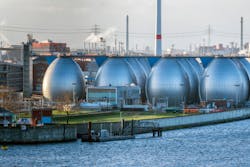Veolia unveils pilot desalination plant in Abu Dhabi
ALEXANDRIA, VA. — Nov. 23, 2015 — Resource management group Veolia has unveiled a pilot-scale seawater desalination plant that was built in partnership with renewable energy company Masdar in Abu Dhabi, United Arab Emirates, according to a press release.
The energy-efficient pilot plant, built in the Ghantoot area of Abu Dhabi, has the same characteristics as future large-scale, low energy consumption desalination plants, noted the release. It is capable of processing very harsh seawater (with salinity up to 52 g/l, temperature which may exceed 42 degrees Celsius and harmful algal blooms).
The plant has been producing potable water since August, abiding by the same operation constraints as a large plant, Veolia said in the release.
So far, Veolia has already lowered the facility’s electrical consumption by 7 percent compared to the contractual target, reported the release. At the same time, the plant’s new pretreatment design could save 25 percent on civil works and reduce the footprint of the plant as well as capital expenditure.
Technologies developed and implemented at the new facility include high performance seawater pretreatment that combines air floatation and filtration, as well as a new osmosis membrane feed configuration able to deal with high treatment fluxes, shared the release. Veolia has also worked with a Swiss company to install new Energy Recovery Devices at the pilot plant.
Veolia experts now plan to push the limits of the system in order to further enhance the design and processes.
Xavier Joseph, CEO of Veolia Gulf Countries, commented in the release: “As a major player in water desalination for the past several decades, Veolia now aims to develop the next generation of sustainable desalination technologies, helping populations and industries in water-scarce regions access this precious resource in an environmentally sound and energy-efficient way. We are very proud to be partnering with Masdar on this ambitious project.”
You can find the entire release here.
